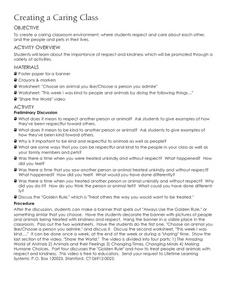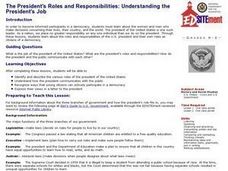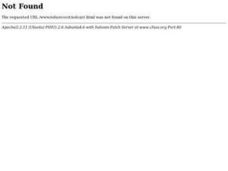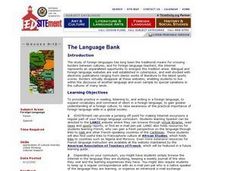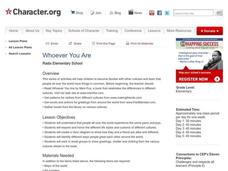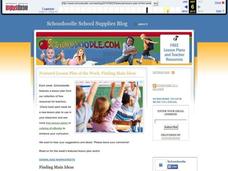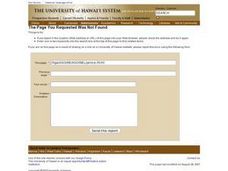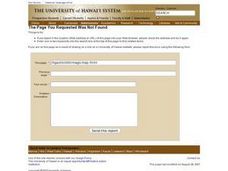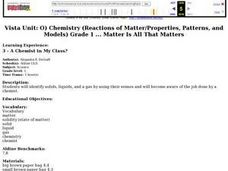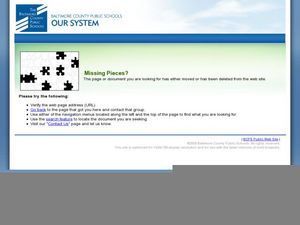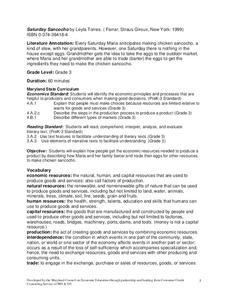Curated OER
Writing About Winter
Students explore the characteristics of winter and use invented spelling processes to describe their observations. A word wall is utilized to assist the learner through the independent writing exercises.
Curated OER
Brazilian Animals
Students research the animals of Brazil. In this animal science lesson, students locate Brazil on a map and discuss the types of animals that can live in its tropical climate. They research a Brazilian Carnaval and see the roll the...
Curated OER
Creating a Caring Class
Students create a caring classroom environment, where they respect and care about each other, and the people and pets in their lives. They explore the importance of respect and kindness. Students are asked "What does it mean to respect...
Curated OER
Counting On Freedom
Students examine the poem and artistic masterpiece The Quadroon Girl and use this knowledge to practice mathematical concepts such as: more than, less than, counting, and majority.
Curated OER
The President's Roles and Responsibilities: Understanding the President's Job
Young scholars examine the roles and responsibilites of the president of the U.S. They identify and discuss the three branches of U.S. government, view and discuss a White House Photo essay online, and create a class book entitled, 'If I...
Curated OER
Recycling: The Way to Save...Fad or Fact
Learners write stories about recycling and illustrate them. They examine various containers and determine whether or not they are recyclable. They make a chart about the containers and visit a recycling center.
Curated OER
Picturing First Families
Students complete a variety of activities as they study Washington, D.C., the Presidency, and George Washington. They take a virtual trip to Washington, D.C., and visit the National Portrait Gallery, the White House, and the Library of...
Curated OER
The Language Bank
Students work on the Internet to listen, read, and practice writing in a foreign language. They focus on the use of idiom and humor in other languages.
Curated OER
Whoever You Are
Young scholars examine cultures, traditions, and feeling throughout cultures. In this cultural lesson, students use literature, maps, and cultural information to examine how people have universal feelings despite their different cultures...
Curated OER
Introducing Recycling
Students study environmental issues of excess garbage and learn about recycling. In this recycling lesson, students discuss recycling and read a story about too much garbage. Students write a persuasive essay about the importance of...
Curated OER
Finding Main Ideas
Elementary schoolers read paragraphs one at a time in order to pick out the main ideas. They choose which sentences are most important in a paragraph. This type of exercise prepares learners to identify the main idea in longer narratives.
Curated OER
America Grows - Trailblazers Pave the Way
Students study the time period after the Revolutionary War when people were striving to move away from the coastal areas and look for pathways to the west. Westerward expansion is a central theme and students use a variety of resources...
Curated OER
Pets Around the World
Students communicate via e-mail with other students to learn about pets, animals of interest , and geography from different parts of the world. Vocabulary focuses on rural, urban, and suburban areas.
Curated OER
Endangered Animals: Hawaii
Students locate regions in Hawaii where specific endangered animals live. They describe habitats, identify reasons why the species has become endangered, consider how a healthy environment for wildlife contributes to a healthy...
Curated OER
Magical Maps
Second graders discuss the importance of using maps and how they are used. After they listen to a folktale, they develop their own story line maps and write their own folktale to accompany a map. They also identify and locate the seven...
Curated OER
The Geography - Writing Connection
Students examine and describe the four physical systems of the Earth. Using two of the systems, they practice their writing skills and use vocabulary associated with the different types of landforms. They predict the types of shelters...
Curated OER
A Chemist in My Class?
First graders in kindergarten science class discuss matter. They make predictions and then identify mystery items in brown paper bags as either solid, liquid, or gas by using their senses. They discuss that a chemist is a scientist that...
Curated OER
Angular Momentum (Automaticity)
Second graders experience practicing with a wide variety of vocabulary terms that relate to the Vista/Module "Angular Momentum:" momentum, inertia, force; motion, direction, centripetal force; angular momentum, gyroscope, resist. They...
Curated OER
Skeeterville
Young scholars explore insect life by participating in a role-playing activity. In this mosquito life lesson, students listen to a role-play scenario in which they must protect a town from mosquitoes by creating a field guide about the...
Curated OER
Portrait of a Friend
Students complete a graphic organizer about themselves and write a short auto-biography. They share their work with a classmate and draw a portrait of a classmate be displayed in the classroom.
Curated OER
Ask a NASA Engineer
Students develop questions to ask a NASA engineer to email them. After emailing the quesitons to the volunteer, the answers are sent to the class via the same method. To end the activity, they formulate more questions and repeat the...
Curated OER
Saturday Sancocho
Second graders identify the economic principles and processes that are helpful to producers and consumers when making good decisions. Students will read, comprehend, interpret, analyze, and evaluate literary text as well as explain how...
Curated OER
A New coat for Anna
Second graders participate in a bartering activity. They discuss the problems of bartering. Students read the book "A New Coat for Anna," by Harriet Ziefert. Students discuss the bartering Anna's mother did. They record the trades made...
Curated OER
Taxi: A Book Of City Words
First graders engage in a literature study that helps them to focus on the concepts of goods and services. They describe the various skills people may need at home, school, and work. Students create a map of businesses found in the city.




